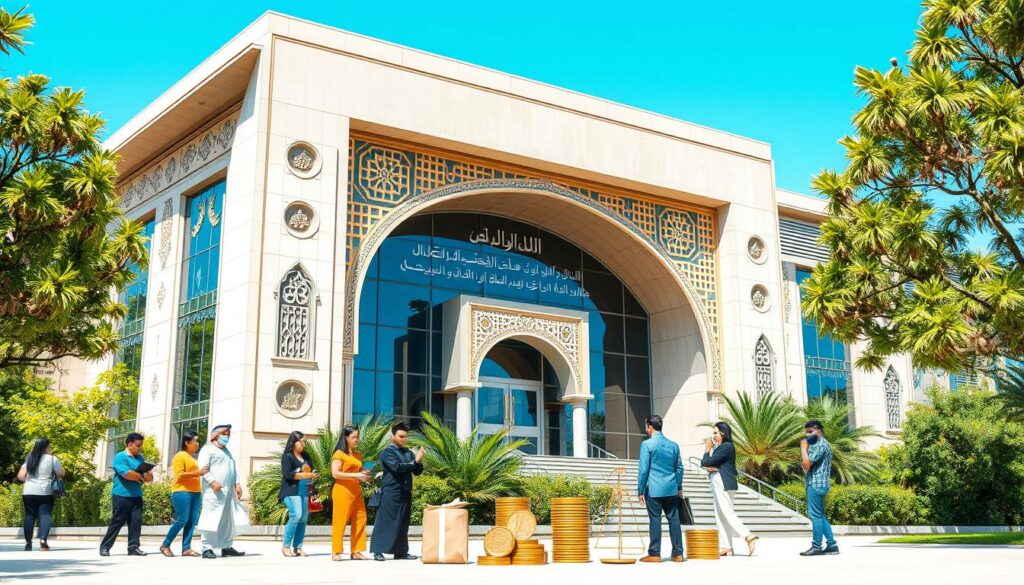The Pakistani Senate has passed the Banking Companies (Amendment) Bill, 2024. This bill aims to strengthen Islamic banking laws in the country. It makes the State Bank of Pakistan (SBP) the main authority for banking companies.
This authority can set clear goals and tools for solving problems. It also helps with funding for these solutions.
A new chapter on Islamic banking has been added to the bill. This chapter aims to make the financial system more inclusive. It helps people get access to unclaimed money and important data.
This move is expected to help Islamic banking grow in Pakistan. It will make financial services more available to everyone.

The Finance Minister says Pakistan has enough money to buy imports for two and a half months. The government wants to keep the economy stable. The new banking laws are part of this effort.
They aim to make the financial system stronger and more open. This will help the economy grow and be more stable.
Key Takeaways
- The Pakistani Senate has unanimously passed the Banking Companies (Amendment) Bill, 2024, strengthening the legal framework for Islamic banking.
- The bill designates the State Bank of Pakistan (SBP) as the resolution authority for banking companies, empowering it to set clear resolution objectives and enhance the resolution toolkit.
- A dedicated chapter on Islamic banking has been included to promote financial inclusion and facilitate access to unclaimed deposits and relevant data.
- The amendments aim to contribute to Pakistan’s macroeconomic stability by fostering a more robust and inclusive financial ecosystem.
- The Finance Minister has assured that the country’s foreign exchange reserves are sufficient to cover two and a half months of imports, and the government is committed to maintaining economic stability.
Understanding Islamic Banking Principles
In Pakistan, Islamic banking is becoming more popular. It follows the rules of Shariah-compliant finance, which means no interest. The main ideas behind it are mudarabah, musharakah, ijarah, and sukuk.
Shariah-Compliant Finance: Riba-Free Banking
Islamic banking doesn’t allow interest (riba) because it’s seen as wrong in Islam. Instead, it focuses on sharing risks. Banks and customers work together, sharing profits and losses fairly. This makes the financial system more ethical and caring for society.
Core Concepts: Mudarabah, Musharakah, Ijarah, and Sukuk
- Mudarabah – a partnership where the bank gives the money, and the customer uses their skills and work.
- Musharakah – a joint effort where both the bank and the customer invest together, sharing profits and losses.
- Ijarah – a leasing deal where the bank buys something and lets the customer use it for a fee.
- Sukuk – Islamic bonds that let you own a piece of something, earning money through sharing profits, not interest.
These ideas help make the financial world fairer and more ethical. As Islamic banking grows in Pakistan, these ideas will shape the country’s money scene.

Islamic Banking
Regulatory Framework: SBP’s Strengthened Role
The Banking Companies Act has been updated to boost the State Bank of Pakistan’s (SBP) role. This change gives the SBP more power to watch over Islamic banking. It makes sure these banks follow Shariah rules.
This new rule is set to help Islamic banking grow in Pakistan. The SBP’s stronger watch will make the industry stronger. It will offer safe and fair banking that fits with Islamic values.
“The amended Banking Companies Act enhances the regulatory role of the State Bank of Pakistan (SBP) to promote islamic banking in the country. The SBP now has strengthened authority to oversee and ensure the compliance of islamic banking operations with Shariah principles.”
The SBP’s new power to enforce Shariah rules will make people trust Islamic banking more. It will also draw in more investors. This is a big step towards a full Islamic finance system in Pakistan.

The SBP’s new role shows the government’s support for Islamic banking. As this sector grows, this rule will be key. It will help keep the sector stable, clear, and true to Shariah. This will help Pakistan’s economy and make sure more people have access to banking.
Financial Inclusion and Complaint Resolution
The new law aims to make financial services more accessible. It simplifies how people can file complaints with the Banking Mohtasib (Ombudsman). This change is expected to help customers solve their issues more easily.
Simplified Procedures for Banking Mohtasib
The government has made the complaint process easier and faster. Some important changes include:
- A new system for filing complaints, making it simpler for customers to share their concerns.
- Strict deadlines for the Banking Mohtasib to look into and fix complaints, ensuring quick action.
- More openness in the complaint process, with regular updates for those who complain.
- The Banking Mohtasib now has the power to fine banks for not following rules or not solving issues.
These changes are expected to increase financial inclusion and trust in Islamic banking. The government wants to make sure customer problems are solved quickly. This will help create a more inclusive financial system in Pakistan.
“The Banking Mohtasib is key in keeping the financial sector honest and open. These updates will help customers easily share their problems and get quick complaint resolution,” said a senior official from the banking mohtasib office.

The banking mohtasib‘s new role and the easier complaint process are big steps. They help make Pakistan’s Islamic banking industry stronger and more reliable.
Pakistan’s Economic Stability and Tax Reforms
Pakistan’s economy is changing for the better. The government is working hard to keep the economy stable. The Finance Minister says Pakistan has enough money to pay for two and a half months of imports.
The government wants to make filing taxes easier. They plan to remove the non-filer category. This means students and housewives won’t have trouble with taxes anymore. They also aim to make tax filing simpler for everyone.
These steps could make Pakistan’s economy stronger. They could also attract more investors. The government is focusing on both economic stability and tax changes to help Pakistan grow.
“The government’s commitment to maintaining Pakistan’s macroeconomic stability and implementing comprehensive tax reforms is a positive step towards ensuring the country’s long-term economic prosperity,” remarked a leading economist.
Pakistan is moving forward in the economic world. These plans show the government’s commitment to a stable and efficient financial system. By focusing on pakistan’s economic stability and tax reforms, Pakistan is ready to grow and develop.
Holistic Approach to Pakistan’s Challenges
The government’s efforts to strengthen Islamic banking and boost economic stability are good steps. However, Pakistan needs a more comprehensive approach to tackle its challenges. This should include improving security, enhancing social welfare, and better governance for lasting progress.
Pakistan faces big security issues like terrorism and political instability. These problems have held back the country’s economic and social growth. The government must work with everyone to improve security, build regional ties, and create a peaceful environment.
Improving healthcare, education, and reducing poverty are key to Pakistan’s growth. By focusing on these areas, the country can enhance citizens’ lives and set the stage for economic success in the long run.

Su sızıntısı tamiri Su kaçağı tespiti için en son teknolojiyi kullanıyorlar. Çok memnun kaldım. https://mediasafar.com/read-blog/835
Malatya çanak anten servisi Dijital uydu alıcımı değiştirdiler, çok memnun kaldım. https://saopaulofansclub.com/read-blog/5497